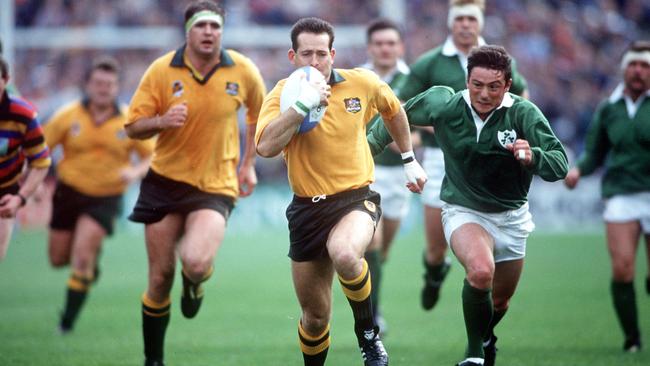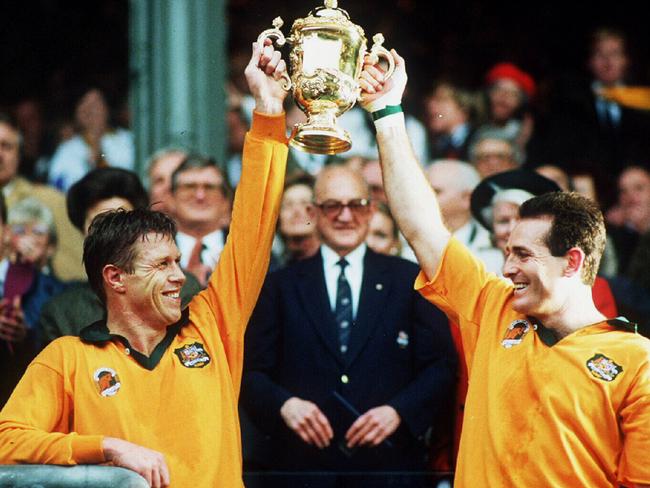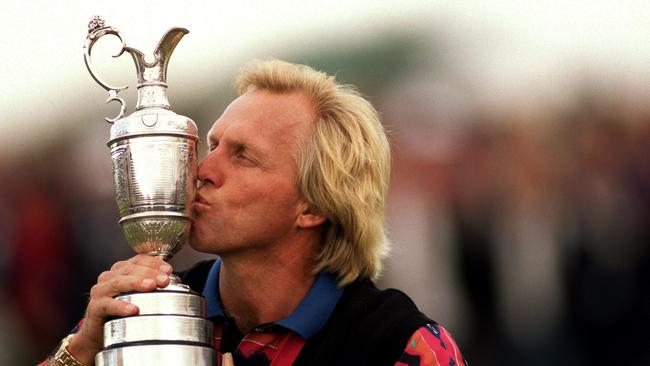Shane Warne ‘a magician capable of anything’: 1990s report
Ear-stud-wearing former ‘party boy’ Shane Warne stunned the cricket world when he took out England’s Mike Gatting at Old Trafford with what became known as the Ball of the Century. Relive the glory here.
For The Australian’s 60th birthday we are revisiting our journalism from the past six decades. Today we look at sport coverage in the 1990s.
Warne adds psychological edge to his deceiving spin
- By Alan Lee, Manchester. First published June 7, 1993
The modern English trend is to patronise leg-spin bowlers and regard them with the amused tolerance a man might show a boisterous but harmless pet dog. After the events of the past 12 months, let alone the past few days, we really ought to know better.
England have lost their past two Test series due, in no small measure, to an opposition leg-spinner. First it was Pakistan’s Mishtaq Ahmed inflicting the indignities, then India’s Anil Kumble.
Now Shane Warne is among us, and already the England batsmen have betrayed themselves as transparently as schoolboys who have failed to study for their exam.
Shortly before this first Test began, bookmakers Ladbrokes offered a price of 3-1 against Warne taking 25 wickets in the series. It did not, at the time, seem generous but those who took it must now be congratulating themselves on the investment of the year.
A single delivery cannot win a series, but very few, down the years, have had the psychological effect of Warne’s first ball of the Ashes on Friday afternoon.
In case any one remains unaware of the freakish happening, it went like this: Warne, bowling to Mike Gatting, pitched his loosener more than a foot outside leg stump and saw it turn almost at right angles to hit the top of off stump.
While Warne performed a justifiable dance of delight, Dickie Bird, the umpire at the bowler’s end, looked as if he had seen a ghost and Gatting, unable to tear himself away from the crease, wore the put-upon look of one who believes the Fates habitually save their worst for him.
I can only pass on second hand the reaction from the England dressing room – shock just about sums it up.
It was not simply that Warne had dismissed one of their best players, first ball. Because Gatting, as everyone knows, is as accident prone as they come and once managed to get out lbw three times in a series without playing a shot.
No, it was the manner of this dismissal, a phenomenon which will have spread fear and alarm. That sort of ball is bowled only in a batsman’s nightmare and the fact that Warne delivered it first up means that he will be treated henceforth as a magician capable of anything.
That, anyhow, was how it seemed for the rest of England’s first innings as the psychology of the moment was fully absorbed.
It cannot have been that Warne came as a surprise to England. Plenty has been heard about him here. But much of the talk has focused on his bad old days when, by his own admission, he was “just a party boy”.
The bleached hair of the surfie makes Warne the antithesis of an English stereotype. The ear stud tops off the image. Add to this the misconception that a leg-spinner is wasting his time on slow English pitches and you have the recipe for him to be underrated.
Of the three further wickets he took, the most significant was that of Graham Gooch, who had been batting with the authority of old until Warne beat him twice running, with subtly different leg breaks. Disorientated, Gooch’s response to a full toss was to spoon it to mid-on.
Warne was far too good for the lower order, as he promises to be all summer. His problem, on this drying pitch, was that the ball spun too much, often beating the bat by several inches rather than finding the edge.
He may not find another pitch like this in the series but that need not matter. The damage has been done, and England’s Achilles heel has been exposed yet again.
‘No other feeling quite like it’
On the eve of the 1999 Rugby World Cup final – won by the Wallabies – one of the stars of the successful 1991 team, David Campese, recalled the glory.

Walking up the Twickenham steps, feeling the coolness of the gold as you’re handed the World Cup, and lifting it high above your head. Even now, the goosepimples are rising. It was, I remember, like an electric shock. One of the greatest feelings of my life.
Nick Farr-Jones, our captain, had received the William Webb Ellis Trophy from the Queen only moments before. He whispered one simple word – “wow” – as Her Majesty, decked out in red, presented the Holy Grail.
It was the moment we had worked for, lived for as a team for more than a year.
And to achieve a goal like that, to eventually fulfil an assignment you had set yourself – and your 30-odd teammates had done the same – is not only euphoric but a great relief.
For the guys who were there in 1991, who helped win that final against England, 12-6, there is never a sleepless night, never a pang of regret, having to look back on that tournament of eight years ago. We had the chance, with the whole world watching, to stand there and hold the World Cup – and we took it.

For other players from other countries who bowed out early or late, there will always be those what ifs, those unfulfilled ambitions and dreams. It has been the same here in 1999. Players such as Jonah Lomu, bigger than a house, even life, but maybe never to win the game’s ultimate prize.
Early tomorrow in Cardiff, the Wallabies will have that chance. I only hope they embrace it and, as their campaign slogan says: “Bring Back Bill.’’
In many respects, there are remarkable similarities between the 1991 side and the one that will run on to Millennium Stadium. We both beat the defending champions at the semi-final stage and faced a northern hemisphere rival in the decider.
It will be a nervous time for the players before the match. There’s all the media pressures leading into the game, the hype and the hoopla surrounding it, and you know all Australia is behind you because of the thousands of faxes that flood the hotel wishing you all the best.
I have given the Australian side a few rev-ups this year about the style of game they’ve adopted. But tomorrow, there are no conditions attached. If they can win, whatever tactics they employ, it will be enough for the nation, and it will certainly be enough for me.
I’ve been there before. I know what it’s like to sit in the dressing room after the game, to soak up the knowledge that you’re the best team on the planet. It’s a once-in-a-lifetime opportunity, perhaps twice in a lifetime for Tim Horan and John Eales.
When it happened in 1991, I remember thinking “this was our destiny’’.
I have exactly the same feeling about tomorrow’s game.
David Campese played 101 Tests for Australia, including for the 1991 World Cup-winning side.
NORMAN DEVOURS GOLF’S DOUBTERS
- Editorial. First published July 20, 1993

Greg Norman did not only play superlative golf to win, after seven long years, his second major championship, the British Open at Royal St George’s. He gave a master’s class, instructive for any athlete, in how to rise above the levelling effect of the tall poppy syndrome.
He had been called a one-major wonder, a choker, a joke, a loser, the great white fish finger. In winning his second British Open, Norman showed that preparation matter most, not the adulation of the crowd; that the self-absorption of skill counts, not self-consciousness before the critics. His was fearless golf; it was sport at its best.

To join the conversation, please log in. Don't have an account? Register
Join the conversation, you are commenting as Logout